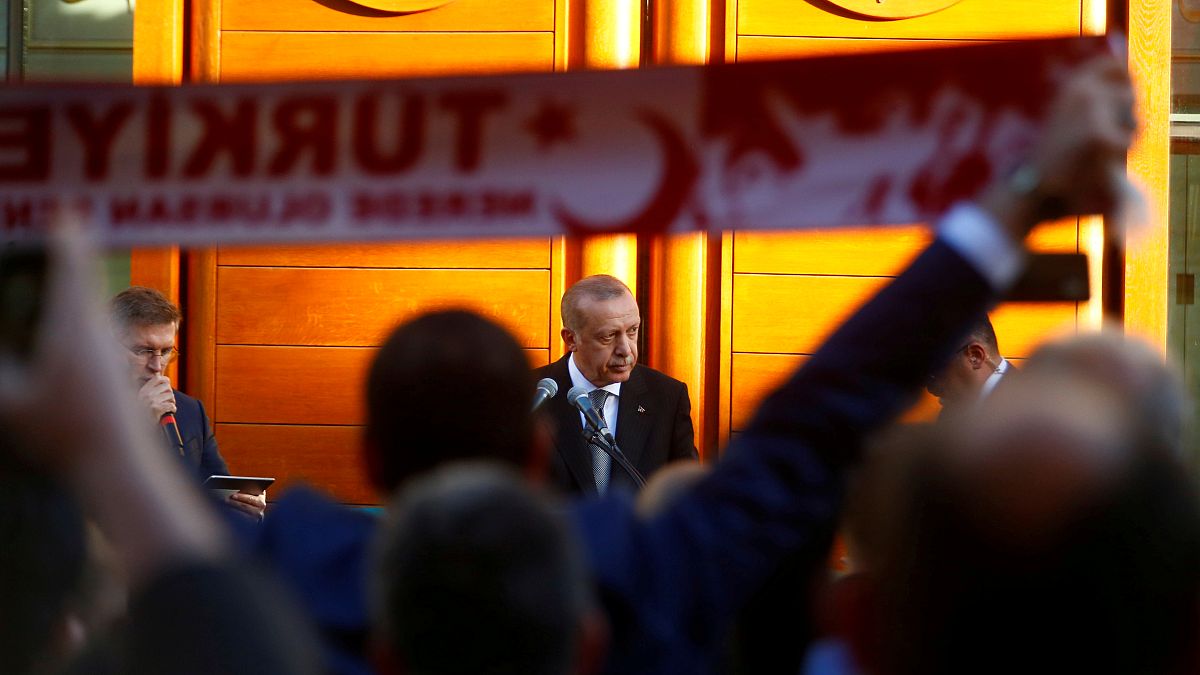Turkish President Tayyip Erdogan wrapped up a three-day visit to Germany on Saturday with a visit to Cologne, where a security lockdown kept supporters and protesters away from a ceremony to open the country's largest mosque.
Turkish President Tayyip Erdogan finished his three-day visit to Germany by opening the country's largest mosque in Cologne.
Police snipers stationed on rooftops were part of a security lockdown to keep both supporters and protesters away from the opening ceremony. The area was cordoned off after the city authorities cancelled plans for up to 25,000 people to attend the opening of the Central Mosque.
"We will continue to protect our citizens regardless of wherever they are," said Erdogan, "We will not allow a group of incompetent FETO (members of US-based cleric Fetullah Gulen's network) and PKK sympathisers to unsettle our citizens and damage Turkish-German friendship."
The building of the mosque was funded by the Turkish-Islamic Union for Religious Affairs (DITIB) an Islamic religious orgnaisation with close ties to Turkey.
Around 1,000 protesters gathered on the opposite bank of the River Rhine after being denied permission to march through the city centre.
Cologne is a pivotal centre for the more than 3 million Turks living in Germany. Both Cologne mayor Henriette Reker and the state's premier Armin Laschet declined to attend the mosque ceremony.
President Erdogan had been invited to Germany in an attempt to repair ties with Berlin after two years of tensions following a failed coup attempt July 2016. Many of his critics have found refuge in Germany since attempting to overthrow his government.
German Chancellor Angela Merkel said after meeting Erdogan on Friday that “deep divisions” remain between the two countries. Syria was reported amoung the main topics discussed between Merkel and Erdogan on his visit, due to both countries feeling major repercussions from the Syrian Civil War. Turkey is hosting more than 3.5 million refugees from the conflict, while Germany has brought in more Syrian refugees than any other European Union member.
Turkey has seen its currency plummet after US trade sanctions were implemented from Washington. These economic struggles have been front in centre in Ankara since Erdogan consolidated immense power into an executive presidency without the safeguards of checks and balances.
Dr. Soner Cagaptay, of the Washington Institute for Near East Policy, told Euronews following Erdogan's reelection in June, that Erdogan now has de-facto control of the judicial and legislative branches, as well as being head of state, head of police, and head of the military.
Some senior German officials told Reuters that providing any new economic aid to Turkey has been ruled out. “The timing of this visit was wrong - it was far too early,” Norbert Roettgen, chairman of parliament’s foreign affairs committee, told the Funke newspaper group. “The Turkish-German relationship is neither better nor simpler after this visit.”
In his final hours in Germany, the Turkish leader sought to interject civility into the purpose of his visit, “In a critical period, we have made a fruitful, successful visit to Germany. I stressed that we need to put aside our differences and focus on our common interests.”
Erdogan also did not shy away from calling on Germany to crack down on Kurdish separatists who now call Germany their home. He also complained in his speech about soccer star Mesut Ozil, who he said had been forced off the German national team after the World Cup due to the footballers' Turkish roots.
